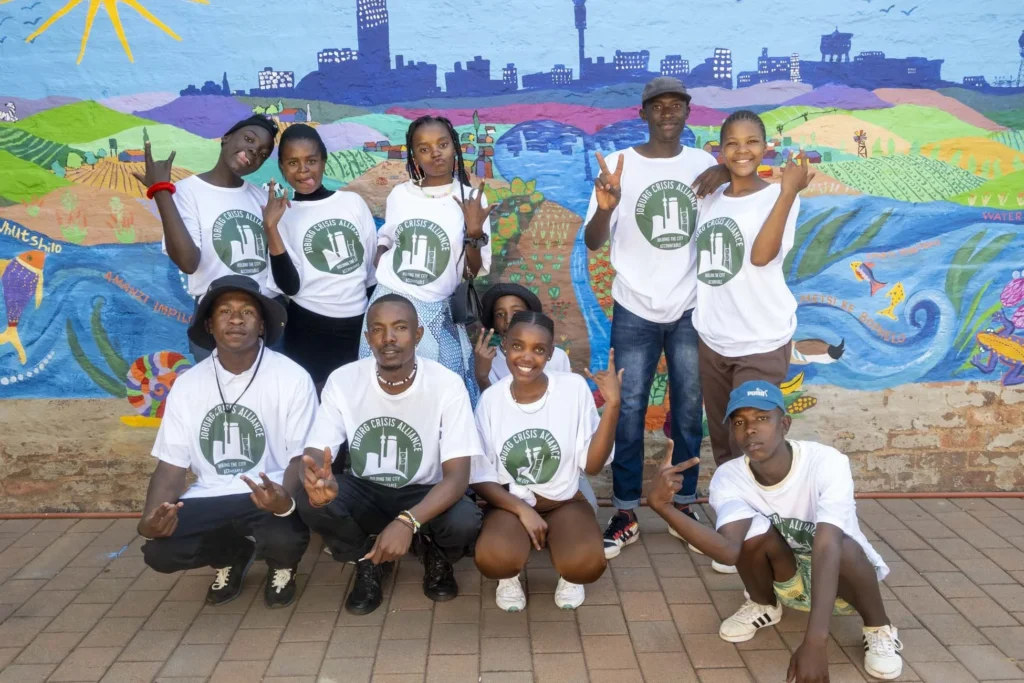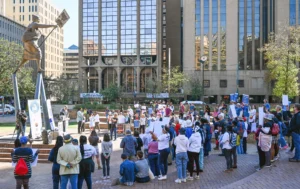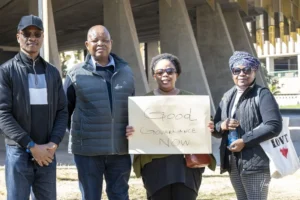How a coalition is trying to save a city

Johannesburg is not just another city.
It is the economic engine of South Africa, the richest city on the continent and a magnet for entrepreneurs, artists and reformers alike. It is home to the Constitutional Court, Soweto and the country’s stock exchange. Joburg or Jozi, as it’s often called, has played a central role in South Africa’s social evolution and it has long stood as a symbol of African urbanism – it is gritty, ambitious, creative, and full of contradictions.
But today, Johannesburg is a city in distress.
The past decade has seen a steady decline in services. Water shortages, rolling blackouts and crumbling infrastructure are commonplace. Corruption scandals continue to chip away at the city’s promise and people’s trust. Political instability has compounded the crisis, with fragile political coalitions, and public institutions hollowed out by mismanagement and patronage.

For residents, the result has been disillusionment and urban decay. For South Africa, the slow collapse of Joburg poses a national threat. This city is too big, too central, and too symbolic to fail.
That’s why, in 2023, a group of residents, civil society organizations, and reform-minded leaders came together to save their city. They formed the Joburg Crisis Alliance (JCA) – a citizen-led, multi-organization coalition that is not only responding to a crisis but aims to shape a vision for the city’s future.
Born from crisis, focused on action
The Joburg Crisis Alliance did not emerge from a boardroom or strategy session. It emerged as an urgent response to a spiraling governance crisis in the city. Joburg had seen multiple mayoral changes, stalled service delivery, and instability fueled by shaky political coalitions at the municipal level.
In mid-2023, a group of concerned citizens and civil society groups called a virtual meeting to grapple with what was happening. They realized that change wouldn’t come from within the city government without pressure. Change had to be driven by residents and through collective civic action. To catalyze this, they organized an open, public summit which was held in July 2023. Over 200 people from all four corners of the city gathered to answer two key questions: How is the chaos in the City of Joburg affecting our lives? And what can we do about it?
From that first gathering, the seeds of the JCA were planted. It became clear that this couldn’t be the initiative of one organization – it had to be broad, diverse, and representative.
A coalition of unlikely partners
Today, the JCA’s coordinator, Mr. Yunus Chamda acknowledges that “the strength of the Alliance lies in its diversity”. The organizations leading the JCA, the Ahmed Kathrada Foundation, Defend Our Democracy, OUTA, Action for Accountability, and the Joburg Inner City Partnership have different political backgrounds and constituencies. Yet, they have put aside differences in service of a shared mission: to restore ethical leadership, functional services, and civic trust in Joburg.
This hasn’t always been easy. Trust-building across racial, political, and geographic lines required persistent dialogue to nurture that shared commitment. As JCA member Ms. Lerato Jiyane puts it, “We really need to come together in the same place and talk to each other, or we won’t see our common ground”. She explained that during the first JCA Summit it quickly became clear that the governance crisis in Joburg had an impact on every neighborhood, class group and race. Residents quickly found themselves united by the state of crisis and their desire to save their city. The JCA has hosted six public summits, with increasing participation and diversity over time.
An advocacy approach based on agility
The JCA tries to stay agile and adaptable when advocating the government. Their model is to engage first, which they’ve done through the summits, petitions, and letters to political principals, including President Ramaphosa. Only if engagement fails, do they escalate their approach. In 2024, the Alliance staged two protests: one against the appointment of a new, unqualified mayor, and another to defend the public library from closure. Both campaigns were successful – the mayor was unseated, and the Alliance secured the re-opening of the library.
Their persistent engagement also paid off. The President responded to their letters, acknowledging Joburg’s governance failure and taking steps to fix it. In April 2024, President Ramaphosa created a new Presidential Johannesburg Working Group (PJWG) and the JCA’s was included as a civil society stakeholder, along with representatives from all three spheres of government, the private sector, academia and labor. This Working Group is a collaborative governance model in action and the JCA now participates in multiple task teams within the Working Groups including those focused on water, transport and other services. They have a seat at the table which they helped to create – this is no small feat.
Building power from the ground-up
Notwithstanding the progress made, there remains much work ahead. The JCA runs five parallel campaigns focused on: ethical and competent leadership, restoring basic services, enabling civic activism, exposing corruption in the city, and reimagining Joburg’s future. One particularly ambitious idea involves funding community workers to host neighborhood dialogues that ask: What’s your vision for your street, your neighborhood, your city? They envision a ground-up approach to city building which is inclusive and innovative. Many would agree that this is long overdue.

In parallel, the members of the JCA are active in repairing broken services and fixing infrastructure themselves, including a home for the aged in the Kensington area of Joburg. “We want to spotlight the problem, but we also want to be part of the solution. Providing a dignified space of our elder residents is essential.”, said Mr. Chamda. Their hope is that by doing the work, they demonstrate what’s possible, while pressuring the City of Joburg to fulfill its responsibilities to all residents.
The JCA has also supported innovations like the Fix Local app, which enables residents to report services delivery outages, and provides them with information needed to collaborate with, and hold local government accountable. The JCA also launched an interactive newsletter to widen civic engagement.
Lessons in coalition-building
What can others learn from the JCA experience so far?
- Start with shared purpose, not shared ideology. The coalition has endured because it prioritizes Joburg’s progress and restoration, over politics and ideology.
- Engage broadly and locally. From high-level advocacy to fixing broken playground equipment in Noordgesig the JCA stays grounded, while also engaging decision-makers to influence systemic changes.
- Persistence matters. Social change is a long game. It is evident from the JCA experience that sustained pressure is needed to move things forward. This requires persistence and agility.
- Representation is the foundation of trust. The summits — now in their seventh iteration — draws hundreds of people. They serve as a civic pulse check and an opportunity to harness the lived experiences of residents from across the city, when advocating for improvements.
- Ethics is not optional. Coalitions should not be used to advance narrow interests. They serve the public interest and to do so legitimately, their practices must be inclusive and ethical.
What’s next for the JCA?
The coalition still faces an uphill climb. They rely on limited funding and generating new resources is hard. They also face political resistance – “Some in the City of Joburg are not enthusiastic about the JCA” as Mr. Chamda explained. But there are several bureaucrats in the city who they count as hard-working, committed allies. The JCA, on behalf of its members, calls for accountability in the city, and accountability is often not easily embraced.
The Alliance is also aware that their involvement in the Presidential Working Group exposes them to the risk of co-optation. To this end,” the JCA is holding the Working Group to account by setting specific goals”, explained a founding member of the alliance, Mrs. Sadia Khan. They plan to assess progress against targets in the next three months, to ensure that the Working Group is performance-based, and not performative. There are also other partners that have stepped up to support the PJWG. Business representatives such as Johannesburg Chamber of Commerce and Industry, The Johannesburg Property Owners and Managers Association and the Jozi-my-Jozi movement have added strength to the stakeholder engagements in the PJWG.
For now, their goal is to keep organizing and keep holding the powerful to account, not just for themselves, but for the future of their city.
The hope is that as the city improves, this initiative may evolve to become the Joburg Civic Alliance, shedding the language of crisis and anchoring a vision of possibility.
If you’re wondering whether civic-led coalitions can still make a difference, look to Joburg. Change is never easy, but progress is possible when people organize with clarity, courage, and a shared commitment to something greater than themselves. We’ll be watching this alliance closely, to learn how collective action can rebuild hope, restore accountability, and chart a new course for one of Africa’s greatest cities.
Visit https://jca.org.za/civic-activism to explore and support the Joburg Crisis Alliance.
—
With thanks to JCA members, Mr. Yunus Chamda, Mrs. Sadia Khan, and Ms. Lerato Jiyane, for generously sharing their time and insights in the interviews, and to Accountability Lab for their invaluable support in coordinating and setting up these conversations.
Join the Governance Explorers
We are bringing together a global network of people eager to rethink governance and influence local, national and global debates.



